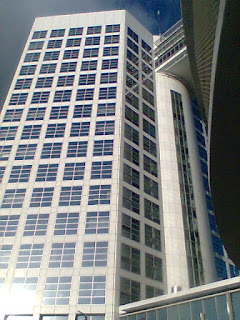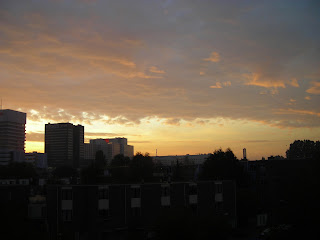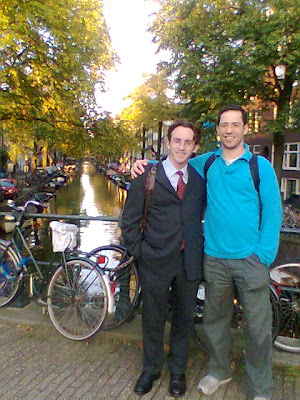Intellectually, The Hague is a wonderful place to be since it stands at the epicenter of international law. In fact, the concept of international law was largely founded by Hugo Grotius at the University of Leiden, just up the road, at the beginning of the 1600s.
I've already been to a two day conference about the ICC - one day in The Hague and one day in Amsterdam; a lecture at the Asser Institute, an international law research institute; and tonight I went to a discussion about Darfur sponsored by the Institute for War and Peace Reporting. Unfortunately, I've had to miss two other interesting conferences, including one sponsored by the International Committee of the Red Cross held at the International Court of Justice. But I'll be back at the Asser Institute on Thursday.
The topic for this evening was Darfuri and Sudanese views on the ICC. The reporters and NGOs recounted that Darfuris do know something about the ICC and that expectations are high, if overly optimistic. Apparently, Darfuris drew up a list of 51 people they hoped to see arrested. Many expect punishment governed by talion.
Given these expectations, the ICC may disappoint. Obviously, an eye for an eye does not exist here as a principle of punishment. The ICC has indicted two Sudanese on war crimes charges stemming from the conflict in Darfur: Ali Muhammad Ali Abd-Al-Rahman and Ahmad Muhammad Harun. The ICC and NGOs are trying to spread their word and principles in Sudan, but (I'm quoting the evening's participants) "to mention the ICC brands you as a traitor... In Darfur, you could be killed just for mentioning the ICC." They said that there is total governmental control of the media. Apparently, a few journalists recently came to The Hague for some training, but were marked as traitors upon their return and denounced by the supposedly-independent journalists' union.
Naturally, Sudan refuses to turn over the two indictees. Until this evening, I didn't quite understand why the government doesn't simply offer them up as pawns to justice and to attain recognition for "international cooperation." It was explained that the government fears that these two would implicate higher-ups. One of the participants is from the same town as Harun. He said that Harun is "really worried" that the government will kill him to silence him; so worried that Harun has apparently "lost weight" and "can't sleep."
The evening's event will be aired on Radio Netherlands Worldwide (like a Dutch version of Voice of America or BBC), on their program "Amsterdam Forum." It should be posted here soon. Shortwave frequencies here.
(Speaking of International broadcasting, did you know that Voice of America reaches out in about 50 languages? Although the Islamic Republic of Iran Broadcasting only offers 27 languages, it has something that VoA does not: news and radio in Hebrew, on Kol David ("The Voice of David"). )
22 October 2007
Darfur
21 October 2007
A bicycle friendly country
After a year navigating the streets (and traffic) of new york city by bicycle, The Netherlands is certainly a joy. There are certainly more bikes here than cars; indeed, it's oft stated that there are more bikes than people. One fast fact at hand: the Amsterdam train station has a parking garage for 2,500 bikes. And that's not counting the masses parked in front of and around the station.
As you can see in these two photos, I don't work in a small building. At fifteen stories, it's the biggest building around and one of the larger buildings in The Hague.
 |  |
This large office building has two parking garages, in front and in the rear -- both are for bicycles only -- there's no car parking. On the left is the my parking lot at work. On the right is a shot of my bike at the supermarket, which also has no car parking.
 |  |
Streets basically have four parts. From left to right in the two photos below: traffic; car parking; bike lane; sidewalk. In fact, the City of New York has proposed exactly that for Manhattan's 9th Avenue, well at least for seven blocks thereof, which would give us cyclists a solid 90 seconds of security. Still, I don't want to knock it, because it is a lovely system and (in an ideal world) perhaps it could catch on in New York. A diagram can be found here (Gothamist).
 |  |
When you come to an intersection, you get your own green/yellow/red traffic signal, at bicycle level (photo on left) and some intersections have bicycle specific direction / distance signs to neighboring towns (photo on right).
 |  |
During rush hour, a lot of bicyclists can arrive to these mini-red lights, so some intersections have special left turn lanes - within the bike lane. (photo on left) In the rare case where the bike lane is not segregated, you get to cut in front of the traffic into a "bike box" while you wait at the light. (photo on right) This concept is much better documented and photographed here, where it shows Manhattan's one and only such "bike box," located at W. 9th and 6th Avenue. (StreetsBlog!)
 |  |
In Manhattan, 6th Avenue is a great way to get uptown because there's a very long bike lane. But when a building is under construction, for some reason the bike lane gets eliminated, leaving you completely at the mercy of traffic. That would never happen here. These photos show two examples of the Dutch making a path for bicyclists, despite the road work.
 |  |
Here are two final photos. On the left, there's some sidewalk work going on, so even the bike lane gets a warning sign. And on the right, a wheelchair-scooter-thing, which is how people in wheelchairs zip around the city in bike lanes.
 |  |
17 October 2007
Switzerland
I spent the weekend in Lausanne, Switzerland. The French alps loom above the town, just across the stunning Lac Lémon.
 |  |
 |  |
And the Swiss countryside....
 |  |
And the Swiss Alps....
 |  |
 |  |
16 October 2007
On Travel

Schiphol, Amsterdam's international airport, is a stop on the main north-south route. It takes only about 20 minutes to arrive from the center of Amsterdam, or 30 minutes and €7 from The Hague. The trains run every ten minutes or so and deposit you directly into the terminal. Couldn't be easier. Obviously, since this is the Netherlands, bicycle paths go to the airport as well.
| No one actually wears the traditional Dutch wooden clogs anymore, although tourists certainly buy them as souvenirs. At Schiphol, they have a creative new use: bathroom flower planters. |  |
Onto Switzerland.... They have these nifty ticket kiosks, even at the neighborhood bus stop. And most fun, you have to buy a child-priced ticket for your dog!
 |  |
And for a European statement on travel, I present this photo, taken in Lausanne: |  |
And finally Geneva airport, with prime diplomatic parking:
 |  |
10 October 2007
Morning View
I basically live in a "project" by the central train station, but this being Europe (and specifically, not France), it's reasonably nice. That said, the view from the balcony isn't much to write home about, or blog about, as the kids say these days. But yesterday morning, the sun reflecting off of the clouds rolling in off of the ocean was stunning. (The camera doesn't begin to do it justice.)
 |  |
 |  |
 |  |
07 October 2007
More Photos
I went to Amsterdam for a conference on Friday. I was happy to see that I am well represented there:
 |  |
I met up with my dear friend Katharina for lunch. After the conference, I met up with my good friend Elad, with whom I lived in Israel in 1998-99.

Elad is working (in Israel) for a Swedish company and was on his way to Sweden for business. En route, he spent two days in Amsterdam and then came down to spend two days with me in The Hague. We spent Saturday walking about in The Hague; the weather was beautiful.
 |  |
 |  |
This is where the Queen works (she lives in the next town over).

This is the International Court of Justice. Andrew Carnegie gave the money to found the institution, hoping it would ensure world peace and end war permanently. It opened one year before world war one.
Incidentally, I don't work here -- I work at the International Criminal Court, which is housed in the former headquarters of the national phone company. Think big Verizon building -- much less nice.

Finally, this is the sunset over the beach at Scheveningen, the fancy end of town. While the Netherlands was occupied by the Germans during World War II, Germans learned Dutch and attempted to infiltrate the Dutch resistance. As a result, the Dutch started using the word "Scheveningen" as a password, since no matter how good their Dutch, this word was still unpronounceable for the Germans. And everyone else.

03 October 2007
two photos
First, Hans and Frans. How could I not take a photo?
Second, yes that's me in a goofy robe. Apparently lawyers in Europe, and at the ICC, wear these robes in court. In Belgian french, they actually call this a "toge" -- a toga! Naturally, within minutes of putting one on, I got sweaty, started sneezing and coughing, and ran out of the courtroom. Thus, I sat there the rest of the time in only a suit and tie. Not a major problem though - seeing as I was in the last row, hiding behind a large computer monitor. 
The Enemies of Freedom
The enemies of freedom have followed me to the Netherlands. See attached photo, taken on my floor, posted following a mission in which said enemies dared to throw away my perfectly good leftovers. 
But luckily, the United States Congress has already (preëmptively) passed the so-called "Hague Invasion Act." No, seriously: "The President is authorized to use all means necessary and appropriate to bring about the release of any person described in subsection (b) who is being detained or imprisoned by, on behalf of, or at the request of the International Criminal Court." 22 U.S.C. § 7427(a).
I'll have to find a lawyer to determine whether the President is sufficiently authorized to invade for the purposes of the release of my leftovers.